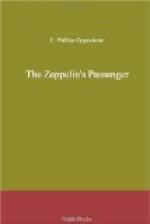Philippa’s eyes seemed to grow larger and rounder.
“He’s raving!” she decided.
“He isn’t!” Helen cried, with sudden divination. “Is that your hat?” she asked, pointing to the table where Nora had left her trophy.
“It is,” he admitted with a smile, “but I do not think that I will claim it.”
“You were in the observation car of that Zeppelin!”
Lessingham extended his hand.
“Softly, please,” he begged. “You have, I gather, arrived at the truth, but for the moment shall it be our secret? I made an exceedingly uncomfortable, not to say undignified descent from the Zeppelin which passed over Dutchman’s Common last night.”
“Then,” Philippa cried, “you are a German!”
“My dear lady, I have escaped that misfortune,” Lessingham confessed. “Do you think that none other than Germans ride in Zeppelins?”
CHAPTER IV
A new tenseness seemed to have crept into the situation. The conversation, never without its emotional tendencies, at once changed its character. Philippa, cold and reserved, with a threat lurking all the time in her tone and manner, became its guiding spirit.
“We may enquire your name?” she asked.
“I am the Baron Maderstrom,” was the prompt reply. “For the purpose of my brief residence in this country, however, I fancy that the name of Mr. Hamar Lessingham might provoke less comment.”
“Maderstrom,” Philippa repeated. “You were at Magdalen with my brother.”
“For three terms,” he assented.
“You have visited at Wood Norton. It was only an accident, then, that I did not meet you.”
“It is true,” he answered, with a bow. “I received the most charming hospitality there from your father and mother.”
“Why, you are the friend,” Helen exclaimed, suddenly seizing his hands, “of whom Dick speaks in his letter!”
“It has been my great privilege to have been of service to Major Felstead,” was the grave admission. “He and I, during our college days, were more than ordinarily intimate. I saw his name in one of the lists of prisoners, and I went at once to Wittenberg.”
A fresh flood of questions was upon Helen’s lips, but Philippa brushed her away.
“Please let me speak,” she said. “You have brought us these letters from Richard, for which we offer you our heartfelt thanks, but you did not risk your liberty, perhaps your life, to come here simply as his ambassador. There is something beyond this in your visit to this country. You may be a Swede, but is it not true that at the present moment you are in the service of an enemy?”
Lessingham bowed acquiescence.
“You are entirely right,” he murmured.
“Am I also right in concluding that you have some service to ask of us?”
“Your directness, dear lady, moves me to admiration,” Lessingham assured her. “I am here to ask a trifling favour in return for those which I have rendered and those which I may yet render to your brother.”




